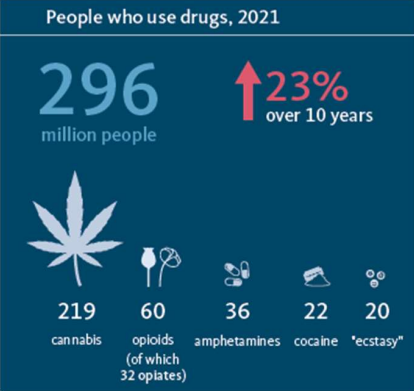
- Ms. Delphine Schantz, Moderator and Representative of UNODC in New York
New York, 26 June 2023
UNODC's 2023 World Drug Report was released and presented to Permanent Missions in New York on 26 June. This coincided with World Drug Day, which in 2023 had the theme "People First: Stop Stigma and Discrimination, Strengthen Prevention".
UNODC's Chief of Drug Research Ms. Chloe Carpentier outlined key findings from the Report, which was compiled using data from Member States. In addition to a 23% rise in the number of people who use drugs in the last 10 years, the number with drug use disorders has risen by 45% in 10 years.
Of particular concern was the finding that only one in five people with a drug use disorder is in treatment, with that figure dropping further for women who face additional barriers to accessing treatment. Ms. Carpentier suggested that social stigma, as well as fear of losing custody of children, may prevent some women from accessing treatment. She added that telehealth innovations as a result of the pandemic have helped reduce stigma and barriers to treatment, but rely on equal access to the Internet.
Next, a panel of experts and a representative of the New York NGO Committee highlighted key issues emerging from the Report, including the surge of synthetic drugs and the impact of drug trafficking on the environment. Ms. Marya Hynes from the Organization of American States expressed concern that the statistic of one in five people with a drug use disorder receiving treatment is probably lower in many OAS states, with the regional gap widening. Mr. Inshik Sim, Lead Analyst (Drugs and Precursors) at UNODC's Regional Office in South-East Asia Pacific warned that the declining cost of precursor chemicals used to make synthetic drugs are lowering the market price. Mr. Lucas Marín Llanes, a researcher at Universidad de Los Andes, called for drug policy indicators to also include communities’ wellbeing. Ms. Nazlee Maghsoudi from the New York NGO Committee on Drugs called for the right to health to be granted to everyone, signaling that treatment must meet the needs of specific populations, including those in humanitarian settings.
Interventions from the floor praised the importance of the Report to inform policy-making and address the drug problem in a comprehensive, inclusive, and balanced manner. Member States discussed strengthening coordination between UNODC regional offices and stakeholders on the ground, as well as expressing concern at the links between drug trafficking and other forms of organized crime. UNAIDS underscored the importance of overcoming stigma in ensuring people have access to healthcare, and civil society stressed the environmental harm of drug production and organized crime.
Moderator Ms. Delphine Schantz underlined the impact of world drug challenges in hindering progress on the Sustainable Development Goals across all areas from peace and justice to health and human rights. She added that she hoped the Report and discussion would prove useful for Member States ahead of the March 2024 Mid-term Review of the implementation of international commitments on drugs.
